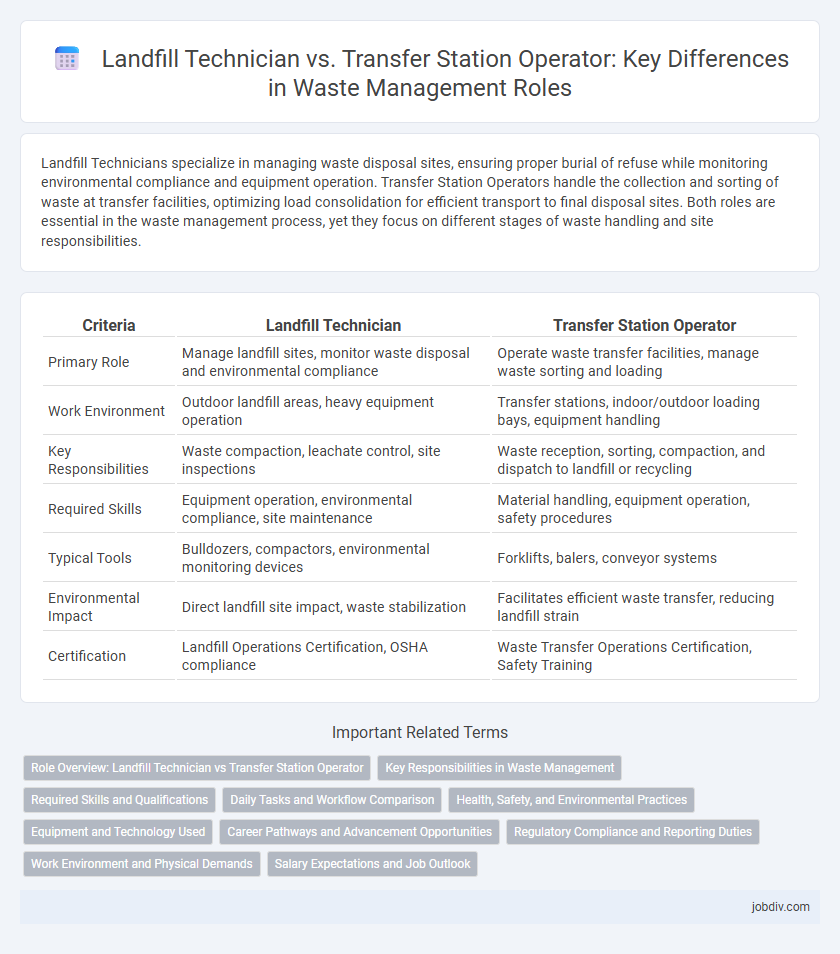Landfill Technicians specialize in managing waste disposal sites, ensuring proper burial of refuse while monitoring environmental compliance and equipment operation. Transfer Station Operators handle the collection and sorting of waste at transfer facilities, optimizing load consolidation for efficient transport to final disposal sites. Both roles are essential in the waste management process, yet they focus on different stages of waste handling and site responsibilities.
Table of Comparison
| Criteria | Landfill Technician | Transfer Station Operator |
|---|---|---|
| Primary Role | Manage landfill sites, monitor waste disposal and environmental compliance | Operate waste transfer facilities, manage waste sorting and loading |
| Work Environment | Outdoor landfill areas, heavy equipment operation | Transfer stations, indoor/outdoor loading bays, equipment handling |
| Key Responsibilities | Waste compaction, leachate control, site inspections | Waste reception, sorting, compaction, and dispatch to landfill or recycling |
| Required Skills | Equipment operation, environmental compliance, site maintenance | Material handling, equipment operation, safety procedures |
| Typical Tools | Bulldozers, compactors, environmental monitoring devices | Forklifts, balers, conveyor systems |
| Environmental Impact | Direct landfill site impact, waste stabilization | Facilitates efficient waste transfer, reducing landfill strain |
| Certification | Landfill Operations Certification, OSHA compliance | Waste Transfer Operations Certification, Safety Training |
Role Overview: Landfill Technician vs Transfer Station Operator
Landfill Technicians manage waste disposal by overseeing landfill site operations, ensuring proper waste compaction and coverage, and monitoring environmental compliance to prevent contamination. Transfer Station Operators handle the receipt, sorting, and temporary storage of waste before it is transported to final disposal locations, optimizing logistics and minimizing environmental impact. Both roles require adherence to safety regulations, but Landfill Technicians focus more on long-term waste containment, while Transfer Station Operators emphasize efficient waste transfer processes.
Key Responsibilities in Waste Management
Landfill Technicians oversee the daily operations of waste disposal sites, including monitoring landfill gas emissions, ensuring proper waste compaction, and maintaining environmental compliance with EPA regulations. Transfer Station Operators manage the efficient receipt, sorting, and temporary storage of solid waste before transportation to landfills or recycling facilities, optimizing route logistics and heavy equipment operation. Both roles are crucial in maintaining waste management infrastructure, emphasizing environmental safety and operational efficiency.
Required Skills and Qualifications
Landfill Technicians require knowledge of waste management regulations, heavy machinery operation, and environmental safety protocols to ensure proper landfill maintenance and compliance. Transfer Station Operators must possess skills in sorting waste, operating compaction equipment, and coordinating waste transfer logistics to optimize facility efficiency. Both roles demand strong problem-solving abilities, attention to detail, and physical stamina to handle dynamic waste processing environments.
Daily Tasks and Workflow Comparison
Landfill Technicians manage daily landfill operations, including monitoring waste disposal, compacting refuse, and ensuring environmental compliance through leachate and gas management. Transfer Station Operators coordinate the intake, sorting, and temporary storage of waste materials before transporting them to final disposal sites, optimizing flow and minimizing contamination. Both roles require strict adherence to safety protocols and efficient equipment operation to maintain smooth waste management workflows.
Health, Safety, and Environmental Practices
Landfill Technicians and Transfer Station Operators both implement rigorous health, safety, and environmental practices to manage waste effectively. Landfill Technicians monitor methane gas emissions, ensure proper waste compaction, and enforce landfill liners to prevent soil and groundwater contamination. Transfer Station Operators focus on safe waste sorting, vehicle traffic control, and odor management to minimize workplace hazards and environmental impact.
Equipment and Technology Used
Landfill Technicians primarily use heavy machinery such as bulldozers, compactors, and excavators designed for waste consolidation and soil layering, along with landfill gas monitoring systems for environmental safety. Transfer Station Operators utilize equipment like front-end loaders, conveyor belts, and balers to efficiently sort, compact, and transfer waste to larger transport vehicles. Both roles incorporate GPS tracking and waste management software to optimize operational efficiency and ensure regulatory compliance.
Career Pathways and Advancement Opportunities
Landfill Technicians specialize in managing waste disposal sites, ensuring environmental compliance, and operating heavy machinery, with advancement opportunities leading to senior technician roles or environmental compliance management. Transfer Station Operators focus on sorting and preparing waste for transportation to disposal or recycling facilities, offering career growth towards supervisory positions or waste management logistics coordination. Both career pathways provide unique skill sets in waste handling and offer progression through specialized training and certifications in environmental safety and operations management.
Regulatory Compliance and Reporting Duties
Landfill Technicians ensure waste disposal meets federal and state environmental regulations by monitoring landfill gas emissions and leachate management, maintaining detailed logs for regulatory reporting. Transfer Station Operators oversee the proper sorting and temporary storage of waste, complying with local permits and preparing accurate transfer manifests for waste tracking authorities. Both roles require meticulous documentation and adherence to OSHA standards to support environmental compliance and reporting obligations.
Work Environment and Physical Demands
Landfill Technicians typically work outdoors in variable weather conditions, managing waste disposal sites that require heavy lifting, operating machinery, and constant vigilance to ensure environmental compliance. Transfer Station Operators often work in semi-enclosed facilities handling the sorting, loading, and unloading of waste materials, demanding repetitive physical tasks such as bending, lifting, and standing for extended periods. Both roles require physical stamina and attention to safety protocols, but Landfill Technicians face more exposure to outdoor elements while Transfer Station Operators work in more controlled yet physically intense environments.
Salary Expectations and Job Outlook
Landfill Technicians earn an average salary ranging from $38,000 to $52,000 per year, with steady demand driven by increasing waste management regulations and landfill expansions. Transfer Station Operators typically receive a comparable salary, around $36,000 to $50,000 annually, with job growth fueled by rising urban populations and the need for efficient waste transfer systems. Both roles offer stable employment prospects in the waste management industry due to ongoing environmental policies and infrastructure development.
Landfill Technician vs Transfer Station Operator Infographic

 jobdiv.com
jobdiv.com